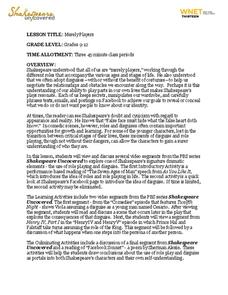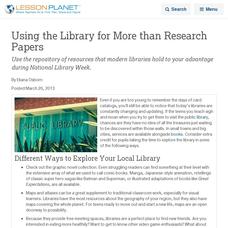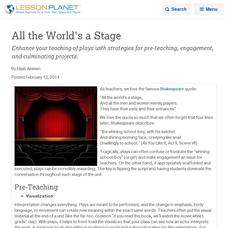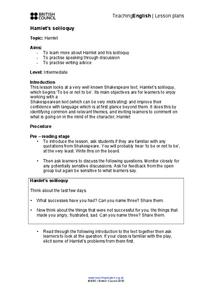Curated OER
Merely Players
Disguises and role playing are the focus of a resource that uses Shakespeare’s As You Like It, Twelfth Night, and Henry IV, Part I, to demonstrate how we all play many parts in our lives; how we all are “merely players.” The many...
Curated OER
Using the Library for More than Research Papers
Use the repository of resources that modern libraries hold to your advantage during National Library Week.
Curated OER
Shakespearean Comedy on Film
This lesson will focus on the aspects of Shakespeare's comedy that become more evident in performance. By viewing clips of the same Shakespeare scene in different film versions, high schoolers have the opportunity to engage in a close...
Curated OER
Mastering the Mighty Melville
“Bartleby the Scrivner” as an existential forerunner to The Office? Dense and often dark, Herman Melville’s stories abound with Biblical allusions and complex symbols. If you are considering using Melville’s novels or short stories with...
Curated OER
Shakespeare: Standing on the Bookshelves of Giant
A phenomenal lesson on Shakespeare! Middle and high school learners create WebQuests about the texts and authors that Shakespeare himself studied when he was in grammar school. They use a variety of media in order to create dramatic...
National Endowment for the Humanities
Hamlet Meets Chushingura: Traditions of the Revenge Tragedy
Learners read texts, view film and video and conduct research in an analysis and comparison of Shakespeare's "Hamlet" and the Kabuki piece "Chushingura". They focus their analysis on the theme of revenge.
Curated OER
All the World's a Stage
Enhance your teaching of plays with strategies for pre-teaching, engagement, and culminating projects.
Curated OER
Exploring the Expository Scenes in Macbeth
Young scholars examine the function of exposition in play structure. They will be able to develop multiple interpretations and visual and aural production choices for Shakespearean scenes and choose those that are most interesting.
Curated OER
Macbeth News Broadcast
Here is an authentic assessment task for Shakespeare's Macbeth. Young literature scholars prepare, perform, and record a news broadcast about the major events in the play. For example, groups may choose to report on the death of Lady...
Curated OER
Persuasive Speech in Julius Caesar
After reading Julius Caesar 1.2 and 1.3, break your class into pairs for this role-play. Each pair will receive one of four prompts (or more, if you create additional examples), in which one person tries to persuade the other to do...
Curated OER
Hamlet's State of Mind
Analyze various excerpts from Hamlet and read articles to develop an argument about his sanity. Middle and high schoolers write an argument essay defending whether or not they believe Hamlet is insane. You could modify this assignment...
Curated OER
That's Moor Like It!
How do modern adaptations of Shakespearean plays relate to their original source material? Middle and high schoolers focus on Shakespeare's play Othello and its screen adaptation "O" to explore how modern film adaptations of Shakespeare...
Curated OER
Taming of the Shrew, Act 4.3, Study Questions
Shakespeare can be a challenge to the most skilled high school readers. This selection of short answer questions helps increase understanding of the character, Katherine, by addressing dialogue, tone of voice, making inferences, and...
Curated OER
Lesson 8: Prithee, Pause!
High school learners examine primary source materials on history and the supernatural which relate to Julius Caesar. They then act out a scene based on different historical understandings and identify facts, theories, and similarities in...
Curated OER
Hamlet's Soliloquy
Everyone is familiar with the beginning of Hamlet's soliloquy, "To be or not to be..." While reading Hamlet, help your middle schoolers analyze the lines that follow, but how do you help them make personal connections to the text? Use...
Curated OER
Discussion Questions for Shakespeare's Julius Caeser
Do not let Julius Caesar be Greek to your pupils. Rather, make the play a dish fit for hungry minds. Encourage your class members to lend their ears to a series of rich discussion questions so that they can become masters of the play, as...
Curated OER
Playing with Puns
"O pun" the door on this activity. Have your pupils compare the puns and word play in scenes from Shakespeare’s Twelfth Night to those in Gary Blackwood’s The Shakespeare Stealer. Warm up and introductory activities, as well as...
Curated OER
A Way with Words or Say What?
Students explore the language of Shakespeare. In this literature lesson, students examine words invented by Shakespeare as they interpret their meanings in drawings. Students pantomime the meanings and then write a short story...
Curated OER
Analyzing Atmosphere: Macbeth Murder Scene and Dagger Speech
Shakespeare's Macbeth (Act II, Scenes I and II) lacks explicit details of the murder of King Duncan, yet the author creates an atmosphere that allows us to visualize the event. Readers interpret the "Dagger Speech" by writing stage...
National Endowment for the Humanities
Hamlet and the Elizabethan Revenge Ethic in Text and Film
Young scholars research the social context of Elizabethan England for Shakespeare's "Hamlet". They identify cultural influences on the play focusing on the theme of revenge and then analyze and compare film interpretations of the play.
National Endowment for the Humanities
Shakespeare's Macbeth: Fear and the "Dagger of the Mind"
High schoolers read and analyze Shakespeare's play, 'Macbeth.' They analyze how Shakespeare uses metaphors, imagery and dramatic cues to demonstrate Macbeth's response to fear, and perform without words a scene dramatizing Macbeth's...
Curated OER
Taming of the Shrew Quiz, Act 5
Five questions help you assess readers' understanding of Act 5 of Shakespeare's Taming of the Shrew. Several of the questions go beyond basic understanding and require higher level thinking and analysis.
Curated OER
Shakespeare's Othello and the Power of Language
Students read and analyze Iago's rhetoric in specific monologues and dialogues with other characters, examine what Iago says and how he says it, define some basic rhetorical terms, and discover the sometimes dangerous power of language.
Curated OER
Figurative and literal language through the study of Shakespeare
Sixth graders explore figurative and literal language. They study literary devices through short pieces of Shakespeare's work. Then investigate Shakespeare's works and life.

























